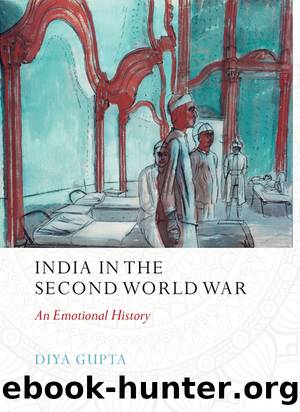India in the Second World War by Gupta Diya;

Author:Gupta, Diya;
Language: eng
Format: epub
Publisher: Oxford University Press, Incorporated
Published: 2023-04-21T00:00:00+00:00
Conclusion
In the two PoW memoirs and the Bengali novel, we journey from life in extremis on the island of New Guinea off the coast of Australia, to the transcendental possibilities of the Italian countryside, and finally to abjection and revolution on the banks of the river Brahmaputra on the Indo-Burma border. In each text, language registers emotion in distinct ways: we move from Crastaâs sparse, economical words that leave much unsaid, to Salviâs romanticised flourishes, and finish with Basuâs overwrought, hectic literary style.
Despite their locational and generic differences, in all three texts, unexpected male friendships challenge the foundations of power structures. In doing so, the memoirs and novel raise important questions regarding the possibilities of affective resistance and the potential for redemption inherent in the act of writing itself, which highlights the failure of power to be performed as it has been imagined. What, then, are these literary âconsolations of writingâ? Why did Crasta compose his PoW account as soon as he returned to India in December 1945? As his severely malnutritioned and disease-ravaged body recovered, did writing itself become a form of therapy? If, as Rivkah Zim puts it, prison writing becomes âone of the most important and durableâ80 methods we have of protecting ourselves against fear, uncertainty, persecution and the depletion of self, this chapter traces how Crastaâs account transforms into an emotional testimony to survival. A crucial part of this is to record seeing humanity in his Japanese captors, to reimagine male communities beyond enemy lines.
Unlike Crasta, it took Salvi forty years before he could write Whom Enemies Sheltered, at first in Marathi and then to translate it into English. Does writing become remembrance for Salvi, a means of capturing the heightened wartime emotions of male bonding before they are lost forever? As we have seen, Salviâs contemplative moments lead to an undoing of the logic of war for him, when he questions the separations enforced by national and ethnic identities. Despite the vulnerability of being a PoW on the run from fascist powers, the homosocial relationship he shares with Romano, former foe and later friend, allows him to retain much of his own agency. The narrative therefore progresses in an arc of strengthening affection and affinity. Finally, Baren Basuâs Rangrut, structured as an emotional and political bildungsroman, takes us through a series of episodes tracing Amolâs journey from Calcutta to a military training camp, army barracks and the banks of the river Brahmaputra, where the final fantasy of collective resistance against colonial power is enacted by its very own soldiers. Here, alternative male belonging is neither contingent nor singular but community-driven and overtly nationalist.
These three texts enable us to reassess historical scholarship on India and the Second World War by illuminating how male friendships forged by Indian men during this war have to reckon with both the discourse of anticolonial nationalism and transnational feeling. For Crasta, resolutely opposed to joining the INA, the possibilities of pan-Asian solidarities open up in his connections with Japanese captors. In
Download
This site does not store any files on its server. We only index and link to content provided by other sites. Please contact the content providers to delete copyright contents if any and email us, we'll remove relevant links or contents immediately.
| Central Asia | Southeast Asia |
| China | Hong Kong |
| India | Japan |
| Korea | Pakistan |
| Philippines | Russia |
The Rape of Nanking by Iris Chang(3530)
The Sympathizer by Viet Thanh Nguyen(3528)
World without end by Ken Follett(3016)
Ants Among Elephants by Sujatha Gidla(2930)
Blood and Sand by Alex Von Tunzelmann(2615)
Japanese Design by Patricia J. Graham(2564)
City of Djinns: a year in Delhi by William Dalrymple(2140)
Inglorious Empire by Shashi Tharoor(2108)
In Order to Live: A North Korean Girl's Journey to Freedom by Yeonmi Park(2064)
Foreign Devils on the Silk Road: The Search for the Lost Treasures of Central Asia by Peter Hopkirk(2061)
Tokyo by Rob Goss(2025)
India's Ancient Past by R.S. Sharma(1994)
India's biggest cover-up by Dhar Anuj(1992)
The Great Game: On Secret Service in High Asia by Peter Hopkirk(1965)
Tokyo Geek's Guide: Manga, Anime, Gaming, Cosplay, Toys, Idols & More - The Ultimate Guide to Japan's Otaku Culture by Simone Gianni(1953)
Goodbye Madame Butterfly(1942)
The Queen of Nothing by Holly Black(1768)
Living Silence in Burma by Christina Fink(1738)
Batik by Rudolf Smend(1726)
